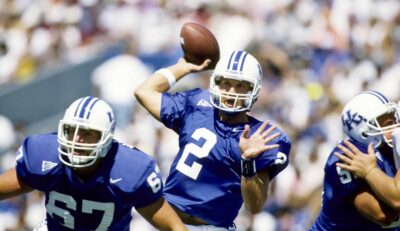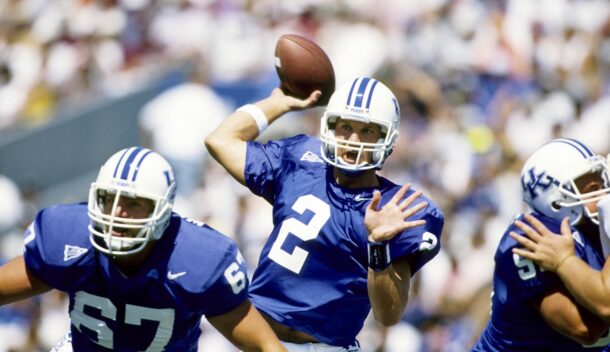From Brooklyn to ‘Bama, the Hall of Fame voice of the Crimson Tide is radio Gold
Eli Gold did it backwards, you see.
You aren’t supposed to go from New York to Alabama as your professional career progresses, usually it’s the other way around, especially when it comes to sports. Even in the realms of broadcasting and journalism, one’s usually waiting for that opportunity in the big time or “The Show” as they call it baseball.
Instead, Gold found his calling here, and while he’s had terrific success as an announcer over the years his name has really become synonymous with Alabama football.
More than being the radio play-by-play man since 1988, he’s known as the voice of the Crimson Tide. Maybe it’s the way he says “Touchdown Alabama!” or as Chuck Culpepper of Washington Post recently wrote with how he described a booming punt at Ole Miss as threatening to land in Tupelo “on the front porch of Elvis’ childhood residence,” when you hear him talk there’s no mistaking the speaker.
He’s radio Gold.
In May, the Brooklyn native was one of eight members inducted into the Alabama Sports Hall of Fame as its Class of 2014. Joining him were Ruthie Bolton, Red Cochran (posthumously), Bill Cody, Travis Grant, Walter Jones, David Magadan and Major Ogilvie.
“It was wonderful, but the whole idea of being in a hall of fame is surreal, really,” he said. “I am totally honored, don’t get me wrong, and I will not give the honor back by any stretch, but I never looked at what I was doing as being hall of fame worthy. The players are the hall of famers, the NASCAR drivers are the hall of famers. The hockey players are the hall of famers. The tennis stars that I’ve covered, they’re the hall of famers. The coaches are the hall of famers.
“I’m merely the conduit of information between those hall of famers and the listeners or viewers. So I never envisioned what I do, or did, as being hall of fame worthy.
“But I was thrilled.”
He was also surprised. Gold was in his home office preparing for assignment when he got the call from ASHOF director Scott Myers, who promptly put him on hold and brought board chairman Edgar Weldon into the conversation offering congratulations.
“I couldn’t believe it.”
Gold was raised in New York during a time when there was only one Major League Baseball team, the Yankees. The Dodgers and Giants had moved west and the Mets had yet to exist. This was well before cable and very few games were on TV, so if you were a baseball fan the only options were the Yankees and listening on the radio.
Like so many other young sports fans Gold used sneak a radio to bed, in his case to hear Mel Allen and Red Barber. Nothing in sports is more romantic than listening to good announcers call a game especially when you have to picture what’s happening for yourself.
Factor in that the Big Apple will always be a baseball town, and New York is an especially special place to be in October when the Yankees are in the playoffs, it’s no wonder Gold got hooked. He got a job selling peanuts to those in the cheap seats at Madison Square Garden and used to try and hang out near the press box, catching announcers as they came and went in hopes of learning their tricks of the trade.
In 1972, Gold began his own broadcast career working as a weekend reporter with the Mutual Broadcasting System. He did minor-league hockey and eventually moved to Alabama to do play-by-play of the Birmingham Bulls of the long-defunct World Hockey Association.
It led to stints with the National Hockey League’s St. Louis Blues and Nashville Predators, and other opportunities as well. He was the first play-by-play announcer for UAB Blazers basketball and stayed on for eight years. He spent four seasons with the Birmingham Barons baseball team and in 1976 signed on to be a member of NASCAR’s Motor Racing Network.
It also led to Tuscaloosa.
“When I was hired to do ’Bama games it was anything but universally accepted, it was not a popular hire,” Gold said. “I was a New York guy, a pro sports guy, with no ties to the university. Some folks went out on a limb and hired me, then protected me from all the barbs and all the slings and arrows that were shot in my direction.
“Some even went so far as to write the university threatening to write it out of their wills.”
That was 26 years ago.
Gold spent about 30 minutes writing his induction speech roughly six weeks before the May ceremony, and then only made some small last-second changes. The essence of his message never waivered, though.
“The whole speech was about mentioning everyone who took a chance on me so that I could live my dream,” he said.
It included the NASCAR’s prestigious France family, which hired Gold when he had never covered a race, and Emile Francis, the former president of the St. Louis Blues.
The Alabama segment featured former associate athletic director Tommy Limbaugh, former athletic director Steve Sloan, and Bert Bank, who founded the Alabama Football Network. Nowadays those thanks go to Nick Saban and Bill Battle, who continue to keep Gold in the broadcast booth at Bryant-Denny Stadium, and emceeing things like Crimson Caravan events and national championship parades.
Much tougher than the speech, though, was deciding what to put in his display case that rests in the Hall of Fame rotunda until the Class of 2015 is announced.
“It was, especially since I didn’t have a lot of stuff like athletes do,” Gold said. “You know I don’t have cleats, I don’t have uniform jerseys, stuff like that. I did have my CBS Sports blazer from my days when I did a lot of events on CBS. So we used that as the basis of the display. I put in a number of my championship rings, both Alabama and other sports, which I have been blessed to be with some very, very good teams, both hockey and baseball, which won league championships.
“Everything else is really tools of the trade.”
They include spotting charts from football and hockey, numerous media passes from various big events including one from Madison Square Garden, a plaque from doing the first broadcast at Joe Lewis Arena in Detroit, a copy of the three books he’s written, some pictures, and, of course, a microphone.
At the end, of course, is his Hall of Fame bronze plaque with his likeness and accomplishments. It’s now on par with the other media entries like John Forney, Jim Fyffe, and Allen, the broadcast legend who was born in Bessemer, became an Alabama alumnus and broadcast legend in New York, where Gold used to tune him in almost daily.
“It’s an outstanding honor,” Gold said of his biggest award. “Halls of Fame trump everything.”
Christopher Walsh has covered Alabama football since 2004 and is the author of 19 books. In his free time, he writes about college football.







